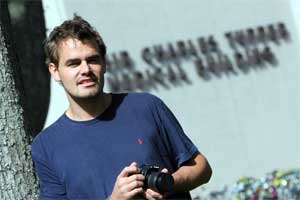 |
| Oliver Brauback is an accomplished photographer and a PhD student in physiology and neuroscience. (Nick Pearce Photo) |
As a PhD student, Oliver Braubach spends hours with his eye to the microscope, trying to get the perfect photomicrograph of the zebrafish brain.
‚ÄúYou really have to know what you‚Äôre doing,‚ÄĚ says Mr. Braubach, 26. ‚ÄúBut you can get some very beautiful pictures of brain cells.‚ÄĚ
From the tiny mountainous country of Liechtenstein, Mr. Braubach first arrived in Nova Scotia almost a decade ago as an exchange student. Instead of returning to Europe to finish high school, he applied to H¬ĢĽ≠ University and graduated with his BSc (Honours) in 2003. He‚Äôs now working toward his PhD in physiology and neuroscience, focusing on the zebrafish as a model for studying learning and memory.
|
SEE DALHOUSIE EXPOSED: A photo essay.ŐżŐż
Even when he‚Äôs not in the lab, he‚Äôs still taking pictures ‚Äď photography has been a passion since his grandfather handed down his 35-mm point-and-shoot camera. He loves the openness of Nova Scotia and enjoys acting as tour guide for family members visiting from Europe.
‚ÄúLiving in the Alps, you can‚Äôt see past the mountains,‚ÄĚ says Mr. Braubach. Landlocked Liechtenstein has a population of 35,000 and is just 160 square kilometers in size (or about three per cent of the size of Halifax Regional Municipality). ‚ÄúHere, I can go to the beach and see the horizon. I really appreciate that.‚ÄĚ
